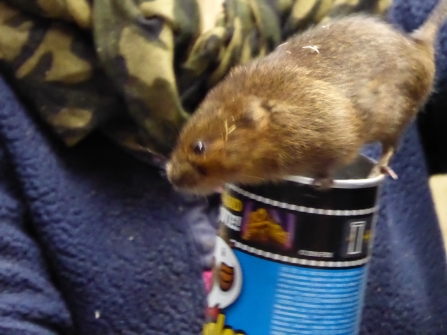
Restoring Ratty: Ratty's Winter Retreat

Derek has been breeding water voles since the 1990s as well as running a working farm, with cattle and sheep. As well as breeding water voles Derek is also involved in rewilding and reintroduction of beavers, white storks and cranes! Derek was great showing us round the breeding facility for the voles and telling us how it works and how a high level of welfare is maintained. We had a walk down to see the beaver area where he has three animals that will be moving on to a project in the Forest of Dean. www.watervoles.com.
The breeding programme for our water voles:
- Winter – Animals are in pens individually, either inside or outside.
- March – Animals are paired up
- Late April – 1st litter
- April – September – 3-4 litters
- July – remove 1st litter from adults. Juvenile WVs need to reach 120g in weight in order to trigger breeding.
A few interesting facts about water voles that were noted during our visit:
- WVs help the food chain, and are themselves a food resource for predators; even trout have been known to eat WVs!
- WVs are not always aquatic; they used to be pastoral.
- At the development site in Glasgow where WVs were taken for the Trossachs project (some of our WVs will also be from Glasgow) there is no water!
- WVs are really sensitive to grazing and cultivation. Grazing animals can decimate populations. WVs moved to aquatic habitats along riparian corridors as they became the only places they could survive.
- A female WV lives approx. 1 ¼ years
- The scent gland on the side of the WV is completely bare of fur when the mammal is in breeding condition
- WVs can gain 1-2 grams in weight per day.
- A healthy adult male weighs 330g
We finished off our Devon trip with a trip to Otterton to meet Devon Wildlife Trust’s Education Officer Paul and his two apprentices. We are running a three site education programme with schools near the capture sites in the North Pennines, one near the release site in Kielder and a further school in Devon near the breeding centre. We had an excellent chat about the Devon side of this and we be working closely with Devon Wildlife Trust on this. Whilst in Otterton we took the opportunity on walking up the River Otter to see the River Otter Beaver Trial (www.devonwildlifetrust.org/river-otter-beavers) and plenty of beaver signs!
Our next trip is to the Trossachs project water vole project which is most similar to the Kielder project in terms of altitude and habitat. 165 water voles were taken from a development project on the outskirts of Glasgow, they were captive bred and over 1000 water voles were released over 3 years. Water voles are now being found 20 miles away from the release points. The team from the project undertook habitat improvement such as stripping back conifers from the Waters edges before WVs returned.
Thanks to everyone who showed us around and hosted us as well as the volunteers who made the trip really enjoyable.

